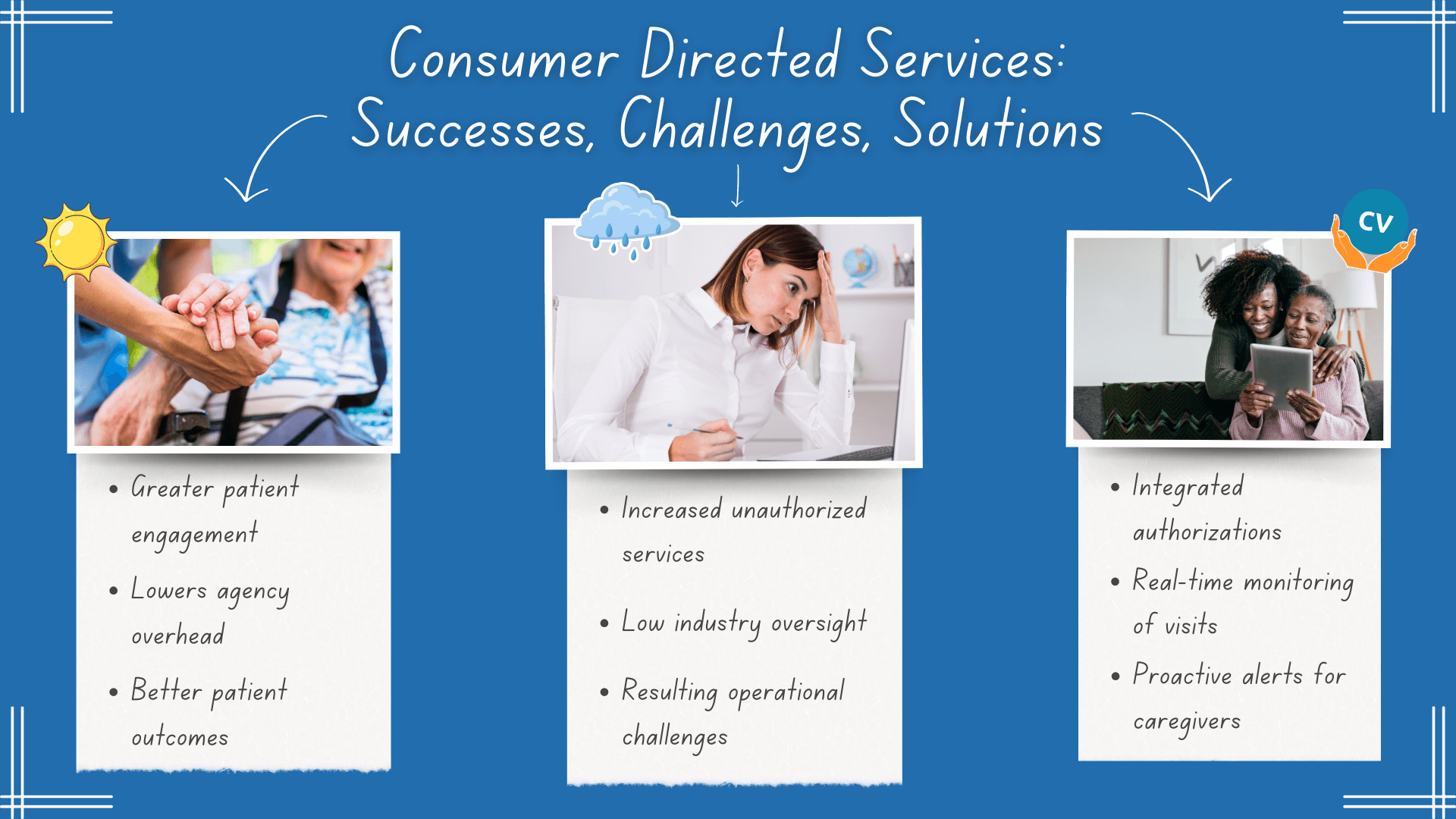

This blog will explain what CDS are and why they are growing, explore the challenges and benefits CDS present to home care agencies, and lay out how home care management software can help home care agencies face those challenges head on while also reaping the benefits of growing CDS.
Between 2019 and 2023, use of CDS increased 23%, with a total of over 1.5 million people signed on for these services. While the Covid-19 pandemic did spur much of this growth, CDS had already been a growing part of the home care sector and continues to grow today. There are, however, some burgeoning challenges that are arising with the expansion of this sector.

This blog will explain what CDS are and why they are growing, explore the challenges and benefits CDS present to home care agencies, and lay out how Home Care Management Software can help home care agencies face those challenges head on while also reaping the benefits of growing CDS.
Consumer Directed Services (CDS), or Self-Directed Care, is a home care program where the patient can hire their own caregiver, rather than having one assigned to them by a home care provider. The hired caregiver is often a family or friend of the patient.
Hiring a friend or family member allows the patient to be more comfortable with a trusted caregiver, lowers outside contact for patients who are immunocompromised, and creates a more flexible schedule for the patient. Overall, Self-Directed Care allows the patient to be more comfortable and more willing to receive personal care at home and can increase both patient and caregiver engagement.

CDS is covered under Medicaid and Medicaid Waiver programs. Home care agencies that provide CDS don’t have to hire their own caregivers and assign them to patients—this is done by the patient. The home care agency, instead, just confirms the visits, creates the claims, and processes the billing and payroll for the caregiver.
Amid industry-wide high caregiver turnover rates, CDS has the potential to incentivize people to join the workforce via patient preference. This simplifies hiring efforts for home care agencies, who then don’t have to worry about attracting skilled caregivers. Furthermore, when the cost of care is covered by Medicaid and Medicaid Waiver programs, it lowers the agency’s overhead costs, creating more growth opportunities and giving them a competitive edge.

Home care agencies providing CDS face significant, but not insurmountable, challenges.
Agencies bill the services provided and pay the caregiver, but they do not schedule the services. Billers and payroll processors only know how many hours were scheduled after the caregiver submits their timesheet. However, Medicaid and Medicaid Waiver programs limit the number of hours that can be provided under CDS. When services go over authorized hours, the home care agencies are saddled with the uncomfortable task of telling the caregivers that they may not get paid for unauthorized services. This can result in operational disadvantages as claims, bills, and payroll need to be processed in a timely manner. These types of inefficiencies cause dissatisfaction in back-office staff, caregivers, and patients.

Unfortunately for the CDS sector of Home Care, fraud is the first thing that comes to mind when Consumer Directed Services are mentioned. Over the years, Self-Directed Care programs and providers have come under higher scrutiny for manipulating hours, collecting on services that were never provided, and having no oversight over caregivers, patients, and agencies who abuse the system. Some states hope to put more regulations in place to help fill the oversight gap, and legitimate CDS providers worry that strict regulations will limit the industry’s growth potential.
While fraud and abuse must be hashed out between policy makers and home care organizations, scheduling and billing inefficiencies can be alleviated by Home Care Management Software.
The right Home Care Software will have the following features to make providing Consumer Directed Services more efficient for everyone:

ONE Patient record and authorizations that are integrated with billing, and payroll can eliminate unauthorized services and reduce overhead costs. Overall, home care agencies can improve their operational efficiency if they invest in the right Home Care Software for CDS.
Consumer Directed Services (CDS), or Self-Directed Care, is a growing, but tricky sector of the home care industry. While there are clear benefits for patients, hired family members or friends, and home care providers, there are also significant challenges to the agency’s operational efficiency and industry regulations.
Home care agencies can benefit from expanding their services into CDS. They can take even more advantage of the growing Self-Directed Care sector by investing in Home Care Software that integrates authorizations with scheduling, billing, and payroll. This will reduce scheduling outside of the authorized limits and improve billing and payroll processing, making the agency more efficient and improving employee and patient satisfaction.
CareVoyant is a leading provider of cloud-based integrated enterprise-scale home health care software that can support all home-based services under ONE Software, ONE Patient, and ONE Employee, making it a Single System of Record. We support all home based services, including Home Care, Private Duty Nursing, Private Duty Non-Medical, Home and Community Based Services (HCBS), Home Health, Pediatric Home Care, and Outpatient Therapy at Home.
CareVoyant functions – Intake, Authorization Management, Scheduling, Clinical with Mobile options, eMAR/eTAR, Electronic Visit Verification (EVV), Billing/AR, Secure Messaging, Notification, Reporting, and Dashboards – streamline workflow, meet regulatory requirements, improve quality of care, optimize reimbursement, improve operational efficiency and agency bottom line.
For more information, please visit CareVoyant.com or call us at 1-888-463-6797.
To learn more about CareVoyant Software and how we improve the operational efficiency of Home Healthcare Agencies, contact us: